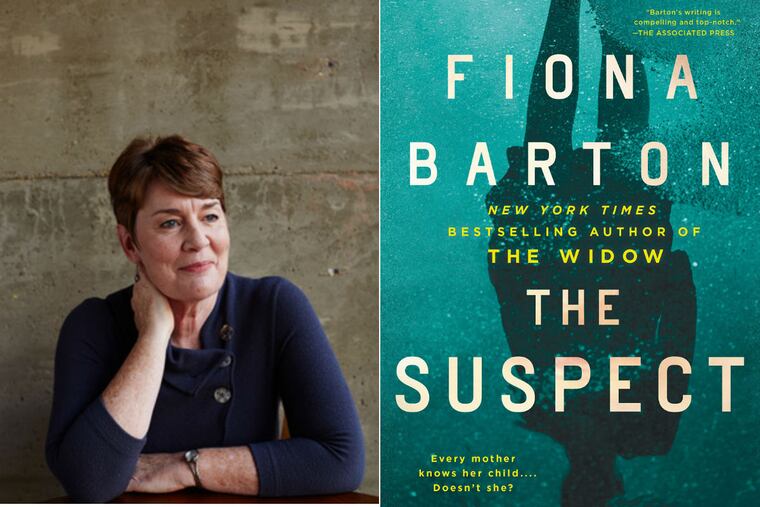‘The Suspect’ by Fiona Barton: A mystery of three couples and loss
The celebrated author's new novel focuses on how parents often suffer when their children go out into the larger world.

The Suspect
By Fiona Barton
Berkley. 404 pp. $26
Reviewed by Patrick Anderson
Fiona Barton’s first two novels, The Widow and The Child, were international best sellers. The British novelist’s third offering, The Suspect, deserves equal success. It’s an expertly written look at a painful subject: the way parents often suffer when their children go forth to confront the dangers of this world. In particular, it’s the story of three couples whose children embark on trips to Thailand that end in tragedy.
Barton was a London journalist before she turned to fiction, and her central character, Kate Waters, is a star reporter for a London paper. Kate and her husband, Steve, are parents of Jake, who dropped out of law school for a soul-searching trip to Thailand. He has been gone two years, and agonizing months pass between his occasional calls home. We soon meet two other young Londoners who are headed for Thailand. In the summer of 2014, 18-year-old Alexandra (Alex) O’Connor sets out with her parents’ reluctant approval for a vacation in Thailand before returning to school. Alex invites her best friend to join her, but the friend drops out at the last moment. Alex then asks a teen she barely knows, Rosie Shaw, to go along. Rosie proves to be trouble.
In Bangkok, the teens stumble onto Mama’s Paradise Bar and Guesthouse, where Mama (“An astonishing figure in a flowing caftan and platinum blond wig”) offers them a small, smelly room for a low price. Mama, they learn, is tolerant of drugs and not above stealing from her guests.
Alex soon tires of Bangkok and wants to escape to a beach, but Rosie is busy with booze, drugs, and sex with boys in the rooming house. Kate’s son Jake turns up and is hired as Mama’s bartender. Both teens are drawn to him ("He was a bit of a lost soul — and Alex couldn’t resist a lost soul”), creating new tensions between them.
Tragedy strikes. There’s a fire in the rooming house and both teens are found dead. It’s no spoiler to relate this; because of the way Barton tells her story, moving back and forth in time, the deaths are known early in the novel. The question is how they died.
The heartbroken parents fly to Bangkok hoping to find that the dead teens are not their daughters. But they are. The parents want answers, but the Bangkok police have run a shoddy investigation and are no help. Kate goes to Bangkok to cover the story for her paper and is horrified to find that her son Jake is a suspect. Soon after the fire, he vanished. In London, an autopsy reveals that the teens did not die because of the rooming house fire. Indeed, the fire may have been started to cover up the real causes of death. Murder is possible, and London police begin a serious investigation.
Detective Inspector Bob Sparkes is a model of dedicated police work, despite the fact that his wife, Eileen, is dying: Her “cancer had come back two months ago, blowing new holes in her, murdering her slowly.” Eileen is a minor character, but her courage makes her memorable. When Sparkes is agonizing over whether to fly to Bangkok, she tells him, “Shut up. I’m fine. Me and my mate morphine are doing a great job. Now do yours.”
Barton’s characterizations are exceptional. She understands how teenagers Alex and Rosie flirt with boys and feud with each other, and she knows how their parents grieve when their daughters are gone. At one point, after Alex’s death, her father tells her mother, “I can’t bear to keep going over and over what happened. I feel so terrible that I couldn’t stop it.” Then, “He sat down and cried silently, his shoulders heaving with the effort.” His wife leaves him to his grief. “She couldn’t take his on as well. Not today.”
By the end of The Suspect, police think they’ve identified the killer of the teens, and he’s about to go on trial. Readers may question his guilt, but for this reader, that ambiguity only makes Barton’s novel more fascinating.
Patrick Anderson reviews thrillers and mysteries regularly for the Washington Post.